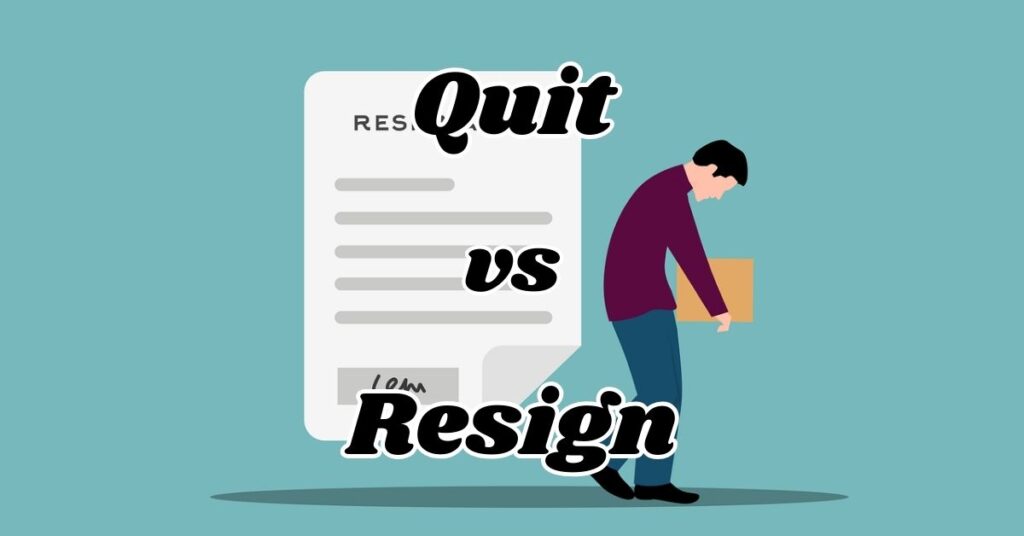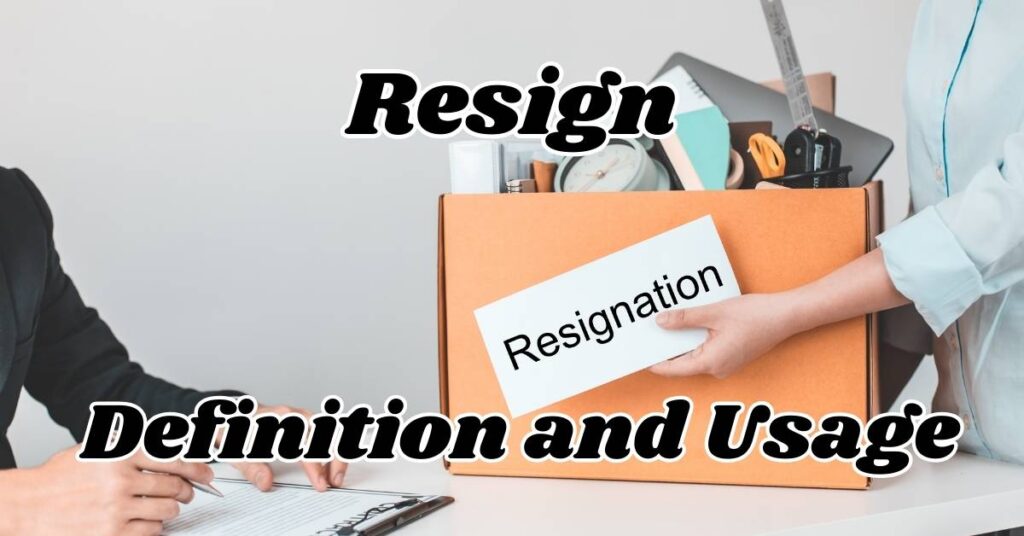Quit vs Resign can often confuse many people, especially in professional settings. While both terms indicate leaving a job or position, they carry different meanings and implications. Understanding these differences is essential for effective communication in the workplace.
When someone decides to quit, it typically suggests an abrupt or informal departure, often fueled by frustration or dissatisfaction. In contrast, resigning implies a more formal process, usually involving a resignation letter and a notice period.
This article will explore the nuances of quit or resign, helping you master their meanings and usage so you can navigate your career with confidence and professionalism.
Quick Summary
Understanding the difference between resign or quit is crucial for effective communication in the workplace. While both terms relate to leaving a job, quit often implies an abrupt or informal departure, whereas resign suggests a formal process that includes giving notice and submitting a resignation letter.
Recognizing these distinctions will help you convey your intentions clearly and maintain professionalism during transitions in your career.
Understanding Quit vs Resign

To grasp the distinctions between these two terms, it’s important to look at their definitions. Quit refers to stopping an action or leaving a situation abruptly. It’s often associated with informal contexts, such as saying, “I decided to quit smoking.”
In contrast, resign implies a more structured approach to leaving a job. When you resign from a position, you typically follow specific protocols, such as providing notice and submitting a formal resignation letter.
The confusion arises because both words describe leaving something behind. However, the emotional tone and implications differ. When someone says they quit, it may suggest frustration or a sudden decision. Conversely, when someone resigns, it often reflects careful consideration and respect for their employer.
Origins of the Quit
The word quit dates back to around 1200, originating from the Old French term “quite,” meaning “free” or “clear.” It also stems from Medieval Latin “quitus,” which translates to “free from obligations.” The term evolved to describe being released from debts or penalties.
By the mid-13th century, it began to denote a state of being deprived of something, such as taxes or claims on property. Overall, quit signifies liberation from various responsibilities or burdens.
Origins of the Resign
Resign emerged in the late 14th century, meaning to “give up” or “relinquish” something, such as a position or claim. It derives from the Old French “resigner” and Latin “resignare,” which means “to cancel” or “to give back.”
The concept involves marking an entry that balances a previous claim, ultimately leading to the formal act of stepping down from responsibilities.
Quit: Definition and Usage

Quit means to stop, leave, or give up something, often abruptly or informally. It can refer to ending a job, breaking a habit, or ceasing an activity. For example, someone might quit smoking or quit a job without notice. Unlike formal resignation, quitting is typically less structured and may not involve following professional protocols like submitting a resignation letter.
“Quit” as Verbs
As a verb, quit signifies the action of stopping or leaving something behind. It often implies an abrupt decision, such as when someone decides to quit their job or quit a bad habit. This term is commonly used in everyday language, reflecting a sense of finality and personal choice.
Whether it’s quitting smoking or leaving a social event, the verb captures the essence of ceasing an activity.
“Quit” as Adjectives
When used as an adjective, quit describes a state of being informal or casual regarding a situation. For instance, one might refer to a “quit attitude” when discussing someone who lacks seriousness about their responsibilities.
Additionally, phrases like “quit the job” can imply a position that was left without much thought or planning. This usage emphasizes a more relaxed approach to leaving roles or commitments.
Quit Meanings
Quit encompasses various meanings, primarily revolving around the idea of stopping or leaving. It can mean to quit a job, ending a habit like smoking, or withdrawing from an activity. Historically, it also implied being free or released from obligations. Today, it’s commonly used to describe ceasing actions abruptly or voluntarily, often reflecting personal choice or dissatisfaction with a situation.
Quit Usage
Quit is widely used in both personal and professional contexts. For example, someone might say, “I will quit my position tomorrow,” or “I need to quit smoking for my health.”
It’s often associated with informal quitting, where no formalities like notice or documentation are involved. The term also applies to breaking habits, stopping behaviors, or leaving situations abruptly.
Usage of “Quit” as a Verb
- I decided to quit my job because I wasn’t happy.
- She plans to quit smoking for her health.
- He had to quit playing video games to focus on school.
- They decided to quit drinking alcohol during the week.
- After much thought, I will quit my position at the company.
Usage of “Quit” as an Adjective
- He took a “quit break” from work.
- This was just a “quit decision” without much planning.
- She has a “quit attitude” toward her responsibilities.
- They had a “quit meeting” with no agenda.
- His “quit approach” led him to leave his role suddenly.
Synonyms of Quit
Here are a few synonyms for quit:
- Stop
- Cease
- Abandon
- Leave
- Give up
- Withdraw
- Terminate
- Discontinue
- Drop out
- Relinquish
Resign: Definition and Usage

Resign refers to the formal act of leaving a job or position, often accompanied by a resignation letter and a notice period. It signifies a deliberate decision to step down from responsibilities, typically with respect and professionalism.
People resign for various reasons, including career changes, personal circumstances, or dissatisfaction with their current role. Unlike quitting, resigning involves following established protocols to ensure a smooth transition.
“Resign” as Verbs
As a verb, resign means to formally give up a position or role, often in a workplace setting. For example, one might say, “I will resign from my job next month.” This action typically involves submitting a resignation letter and providing notice to ensure a smooth transition.
The verb conveys a sense of professionalism and intention, highlighting the importance of following proper procedures when leaving an organization.
“Resign” as Adjectives
When used as an adjective, resign describes a state of acceptance or submission to circumstances. Phrases like “resigned attitude” reflect a person’s acceptance of their situation without resistance.
Additionally, one might refer to someone as having a “resigned demeanor” when they appear calm and accepting about their decision to leave a position. This usage emphasizes the emotional aspect of resigning, highlighting the sense of closure that often accompanies the act.
Resign Meanings
Resign primarily means to formally give up a job, position, or responsibility. It involves a deliberate decision to step down, often accompanied by a resignation letter and notice period.
Additionally, resign can mean accepting an unavoidable situation, such as “resigning oneself to fate.” This dual meaning reflects both professional and emotional contexts, emphasizing either formal departure or personal acceptance of circumstances.
Resign Usage
In professional settings, resign is used when someone formally announces their intention to leave a role. For example, “She decided to resign from her position after five years.”
It conveys professionalism and respect for workplace protocols. Beyond jobs, it is also used emotionally, such as “He resigned himself to the loss,” indicating acceptance of an inevitable event.
Usage of “Resign” as a Verb
- He chose to resign from his position, citing personal reasons.
- She will formally resign next week, giving two weeks’ notice.
- The manager decided to resign after the company’s restructuring plan was announced.
- They announced their intention to resign from the board of directors.
- After careful consideration, I have decided to resign my role at the firm.
Usage of “Resign” as an Adjective
- His “resigned demeanor” showed he accepted his fate.
- She spoke with a “resigned tone,” indicating her decision was final.
- The team felt her “resigned attitude” during meetings.
- He had a “resigned expression,” knowing he would leave soon.
- Their “resigned response” showed they were prepared for change.
Synonyms of Resign
Here are few synonyms of resign:
- Step down
- Leave
- Vacate
- Relinquish
- Abdicate
- Withdraw
- Surrender
- Give up
- Retire
- Depart
Side by Side Comparison
| Aspect | Quit | Resign |
| Formality | Informal | Formal |
| Notice | Immediate | Typically requires notice |
| Tone | Often negative | Generally positive |
| Future Impact | May harm references | Better for future references |
Everyday Usage Examples

Quit and resign are commonly used to describe leaving jobs or activities. For instance, someone might say, “I decided to quit my job because it wasn’t fulfilling,” highlighting an abrupt decision.
Conversely, another person might state, “I will resign from my position next month,” indicating a formal and planned departure.
These examples illustrate how the context and tone differ between informal quitting and formal resigning in everyday language.
Quit Example in a Sentence
- I decided to quit my job because it wasn’t fulfilling anymore.
- She wants to quit smoking for her health.
- He quit playing video games after realizing it affected his studies.
- They quit drinking soda for better health choices.
- After much thought about my career path, I will quit my current role.
Resign Example in a Sentence
- He plans to resign from his position next month after finding another opportunity.
- She submitted her resignation letter last week with two weeks’ notice.
- The director announced he would resign due to personal commitments.
- They are preparing to resign from their roles on the committee next year.
- After careful consideration of her career goals, she decided it was time to resign properly.
Common Mistakes
Many people confuse quit and resign, using them interchangeably without understanding their nuances. A common mistake is saying “I resigned from my job” instead of “I resigned from my job.”
Additionally, using quit in formal contexts can undermine professionalism, while resign is more appropriate for structured departures.
Tips to Avoid the Mistakes

- Always consider formality; use “resign” for professional contexts and “quit” for informal ones.
- Remember that quitting can imply frustration; be mindful of your tone when using it.
- If you plan on leaving your job respectfully with notice and documentation, choose “resign.”
- Use “quit” when discussing personal habits or informal situations like quitting smoking or other activities.
- Familiarize yourself with resignation protocols in your workplace; this will help clarify when it’s appropriate to use each term.
More Article: Churchs or Churches: What’s the Difference?
FAQs: Quit vs Resign
Can I quit without resigning?
Yes, you can quit without formally resigning, but it may affect your professional reputation.
Is resign another word for quit?
While they both refer to leaving a position, resign implies a formal process, whereas quit is more informal.
Is it better to say resign or quit?
It depends on the context; use resign for formal situations and quit for informal or abrupt departures.
Is it OK to resign quietly?
Resigning quietly is acceptable, but it’s generally better to provide notice and communicate your decision professionally.
Conclusion
Understanding the differences between quit vs resign is essential for effective communication in both personal and professional contexts. While quitting often implies an abrupt and informal departure, resigning involves a structured process that reflects professionalism and respect for workplace norms.
By recognizing when to use each term appropriately, you can navigate career transitions more smoothly and maintain positive relationships with employers and colleagues. Mastering these distinctions will enhance your communication skills and help you make informed decisions about leaving a job or position.
Related Post: Scraped vs Scrapped: What’s the Difference?

